SPHE 421 (SPHE421)
American Military University
All 13 results
Sort by
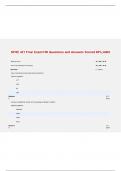
-
SPHE 421 Final Exam/100 Questions and Answers Scored 95%;AMU
- Exam (elaborations) • 43 pages • 2024
-
- $20.49
- + learn more
SPHE 421 Final Exam/100 Questions and Answers Scored 95%;AMU SPHE 421 Final Exam/100 Questions and Answers Scored 95%;AMU Attempt Score 95 / 100 - 95 % Overall Grade (Highest Attempt) 95 / 100 - 95 % Question 1 1 / 1 point How many bones make up the human skeleton? Question options: 217 126 80 Question 2 1 / 1 point A bone marking that consists of a sharp ridge or border is called a Question options: foramen head fossa Question 3 1 / 1 point ...
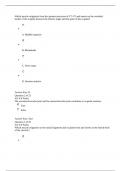
-
SPHE 421 Questions & Answers. Complete Solutions Guide. All 100% Correct
- Exam (elaborations) • 17 pages • 2023
-
- $9.99
- + learn more
Which muscle originates from the spinous processes of C7–T5 and inserts on the vertebral border of the scapula between the inferior angle and the spine of the scapula? A. Middle trapezius B. Rhomboids C. Teres major D. Serratus anterior Answer Key: B Question 2 of 25 4.0/ 4.0 Points The acromioclavicular joint and the sternoclavicular joint contribute to scapular motions. True False Answer Key: True Question 3 of 25 4.0/ 4.0 Points Which muscle originates on ...
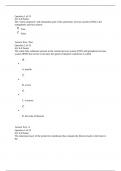
-
SPHE 421 Questions & Answers. Complete Solutions Guide. All 100% Correct
- Exam (elaborations) • 16 pages • 2023
-
- $9.99
- + learn more
Question 1 of 25 4.0/ 4.0 Points The “stress-response” and stimulation part of the autonomic nervous system (ANS) is the sympathetic nervous system. True False Answer Key: True Question 2 of 25 4.0/ 4.0 Points The white fatty substance present in the central nervous system (CNS) and peripheral nervous system (PNS) that serves to increase the speed of impulse conduction is called A. myelin B. a tract C. a neuron D. the node of Ranvier Answer Key: A Question...
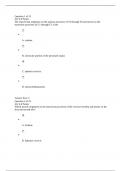
-
SPHE 421 Questions & Answers. Complete Solutions Guide. All 100% Correct
- Exam (elaborations) • 17 pages • 2023
-
- $10.49
- + learn more
Question 1 of 25 4.0/ 4.0 Points The muscle that originates on the spinous processes of T3 through T6 and inserts on the transverse processes of C1 through C3 is the A. scalene. B. clavicular portion of the pectoralis major. C. splenius cervicis. D. sternocleidomastoid. Answer Key: C Question 2 of 25 4.0/ 4.0 Points Which muscle originates on the transverse processes of the cervical vertebra and inserts on the first and second ribs? A. Scalene B. Splen...
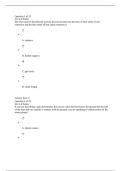
-
SPHE 421 Questions & Answers. Complete Solutions Guide. All 100% Correct
- Exam (elaborations) • 17 pages • 2023
-
- $9.99
- + learn more
Question 1 of 25 4.0/ 4.0 Points The term used to describe the activity that occurs between the time of heel strike of one extremity and the heel strike of that same extremity is A. cadence. B. double support. C. gait cycle. D. stride length. Answer Key: C Question 2 of 25 4.0/ 4.0 Points If you are describing a gait abnormality that occurs when the heel leaves the ground but the ball of the foot and toes remain in contact with the ground, you are speaking of whic...
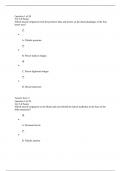
-
SPHE 421 Questions & Answers. Complete Solutions Guide. All 100% Correct
- Exam (elaborations) • 14 pages • 2023
-
- $9.49
- + learn more
Question 1 of 20 5.0/ 5.0 Points Which muscle originates from the posterior tibia and inserts on the distal phalanges of the four lesser toes? A. Tibialis posterior B. Flexor hallucis longus C. Flexor digitorum longus D. Dorsal interossei Answer Key: C Question 2 of 20 5.0/ 5.0 Points Which muscle originates on the fibula and runs behind the lateral malleolus to the base of the fifth metatarsal? A. Peroneus brevis B. Tibialis anterior C. Tibialis...
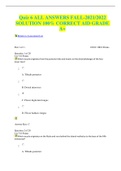
-
Quiz 6 ALL ANSWERS FALL-2021/2022 SOLUTION 100% CORRECT AID GRADE A+
- Other • 13 pages • 2021
-
- $11.49
- + learn more
Which muscle originates from the posterior tibia and inserts on the distal phalanges of the four lesser toes? • A. Tibialis posterior • B. Dorsal interossei • C. Flexor digitorum longus • D. Flexor hallucis longus Answer Key: C Question 2 of 20 5.0 / 5.0 Points Which muscle originates on the fibula and runs behind the lateral malleolus to the base of the fifth metatarsal? • A. Tibialis posterior • B. Peroneus brevis • C. Peroneus ter...
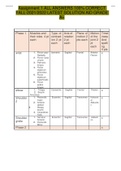
-
Assignment 1 ALL ANSWERS 100% CORRECT FALL-2021/2022 LATEST SOLUTION AID GRADE A+
- Other • 3 pages • 2021
-
- $7.49
- + learn more
Phase 1 Muscles and their roles 4 pt each Type of contract ion 2 pt each Axis of rotation 2 pt each Plane of motion 2 pts each Motion of the joint 2 pt each Timel iness And spelli ng 4 pts wrist 1. Flexor carpi Radiallis 2. Flexor Carpi ulnaris 3. Palmaris longus 4. Flexor digitorum profundus 5. Flexor digitorum superficialis 6. Flexor pollics longus Isometric Sagittal Frontal Anterior Flexion x elbow 1. Triceps 2. Brachii Anconeus Concentric Sagittal Frontal Flexion x Shoulder jt 1...
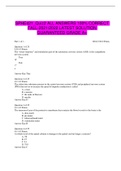
-
SPHE421_Quiz2 ALL ANSWERS 100% CORRECT FALL-2021/2022 LATEST SOLUTION GUARANTEED GRADE A+
- Other • 5 pages • 2021
-
- $10.99
- + learn more
The “stress-response” and stimulation part of the autonomic nervous system (ANS) is the sympathetic nervous system. True Fals e Answer Key:True Question 2 of 25 4.0 / 4.0 Points The white fatty substance present in the central nervous system (CNS) and peripheral nervous system (PNS) that serves to increase the speed of impulse conduction is called A. a tract B. a neuron C. the node of Ranvier D. myelin Answer Key:D Question 3 of 25 4.0 / 4.0 Points The innermost layer of the pr...
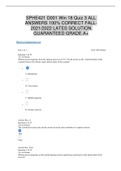
-
SPHE421 D001 Win 18 Quiz 3 ALL ANSWERS 100% CORRECT FALL-2021/2022 LATES SOLUTION GUARANTEED GRADE A+
- Other • 13 pages • 2021
-
- $11.49
- + learn more
Question 1 of 25 4.0 / 4.0 Points Which muscle originates from the spinous processes of C7–T5 and inserts on the vertebral border of the scapula between the inferior angle and the spine of the scapula? • A. Rhomboids • B. Teres major • C. Middle trapezius • D. Serratus anterior Answer Key: A Question 2 of 25 4.0/ 4.0 Points The acromioclavicular joint and the sternoclavicular joint contribute to scapular motions. True False Answer Key: T...

Study stress? For sellers on Stuvia, these are actually golden times. KA-CHING! Earn from your study resources too and start uploading now. Discover all about earning on Stuvia


